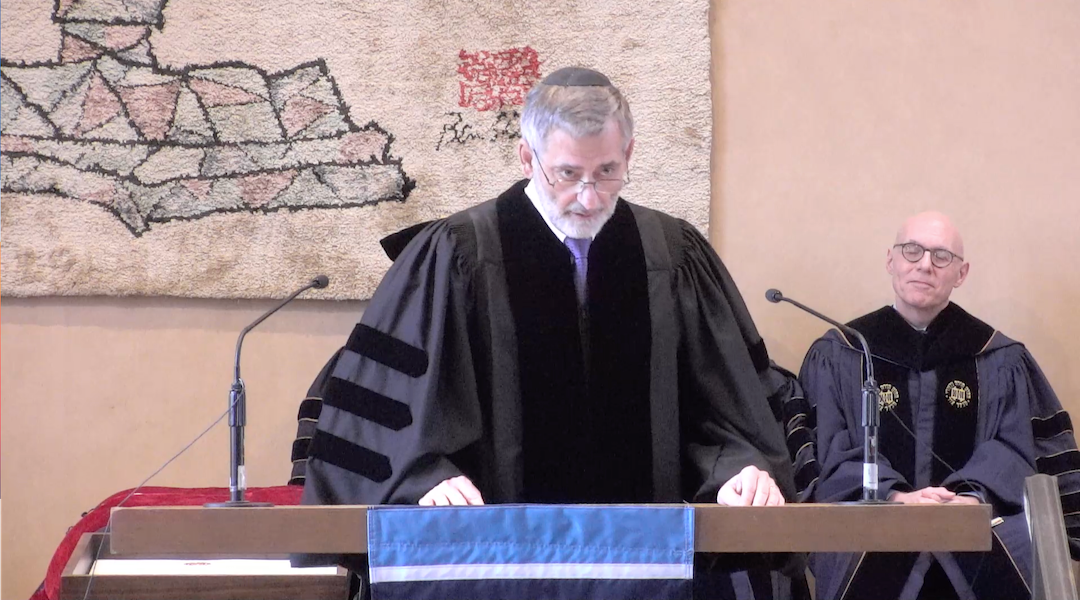(JTA) – When Rabbi Mark Washofsky took the podium Thursday to deliver the “Founders’ Day” address at Hebrew Union College in Cincinnati, he didn’t speak about Talmud, Jewish law or bioethics, topics he taught students there for more than four decades.
Instead, he took aim at a looming proposal to end rabbinic training at HUC-Cincinnati, excoriating the plan as a shortsighted response to budget woes and an affront to both the vision of HUC’s founder, Rabbi Isaac Mayer Wise, and to the school’s history as an academic powerhouse.
“We’re living in an age of contraction and cutback, of synagogue mergers and low enrollment. The college can no longer afford a 20th century institutional footprint. Something’s got to give,” he said, mocking the thinking of the proposal’s authors.
“And guess what, these buildings you see here? They sit right smack dab in the middle of flyover country. But the ax has got to fall. What about that vision, that thing about academic excellence? Is that also a 20th century thing?”
His 18-minute speech drew a standing ovation and prompted HUC President Andrew Rehfeld, who embraces the proposal, to discard his own prepared remarks.
It was a potent encapsulation of the mounting backlash against the proposal, which HUC’s board is scheduled to vote on next month in New York City. An anonymous Twitter account has been sharing objections to the plan alongside unverified rumors and insults directed at Rehfeld, while an open letter from “concerned alumni” outlining objections currently has around 150 signatures from rabbis and other graduates of HUC.
“We are certain that this plan will result in innumerable and irreversible tragic outcomes,” the letter states.
At least one regular donor whose will currently includes HUC as a beneficiary plans to rewrite the will to exclude the seminary if the proposal passes, the person told the Jewish Telegraphic Agency on the condition of anonymity because the vote has not taken place.
The concerns are about more than just where HUC’s rabbinical students enroll. In his speech, Washofsky also hinted at discussions beyond the scope of the written proposal, charging that unnamed figures at HUC have also discussed doing away with the other facets of the Cincinnati campus: the graduate program, the American Jewish Archives and the Klau Library.
“The graduate school isn’t part of our core mission? Try telling that to the founder as you sit in his house,” he said, referring to the Cincinnati campus.
Later, speaking of the library and the archives, he said they “are nothing less than treasures of the Jewish people, and that we are truly privileged to be their custodians. But there are those who tell us that these treasures, too, are luxuries, that they’re too expensive for us to maintain, that they’re unnecessary for rabbinical education.”
He concluded, “In our hands rest the fate of the vision of the founder – something I think maybe all of us should think about on this day, as we sit in his house.”
After the speech, Washofsky returned to his seat next to Rehfeld’s on the stage, as the president joined others in applauding the professor emeritus.
Rehfeld later declined to deliver remarks he had prepared for Founders’ Day, saying instead, “After what we heard, there’s no competition of the vision of what the founders stood for.”
Rehfeld continued, “Whether or not we agree or disagree on how the vision gets articulated, it simply is inspiring. So thank you.” He added that he would make sure that the Zoom recording of Washofsky’s speech would reach HUC’s board before Shabbat.
Board members are scheduled to vote during their April 10 and 11 meeting on the proposal, which Rehfeld and others in HUC’s administration say is a necessary step to address declining enrollment and maintain HUC’s relevance amid a changing landscape for rabbinic training.
The proposal as written does not indicate any changes to any other aspect of the Cincinnati campus beyond its seminary, and Rehfeld has told JTA that there are no such plans to close the campus itself, though he said the doctoral program would begin disassociating from Cincinnati’s physical location and allowing students to enroll on its other campuses should the proposal pass. HUC also has a small cantorial program.
JTA has documented Jewish history in real-time for over a century. Keep our journalism strong by joining us in supporting independent, award-winning reporting.






